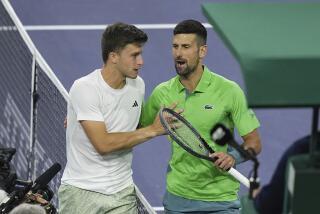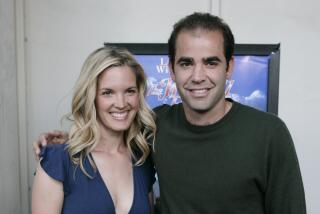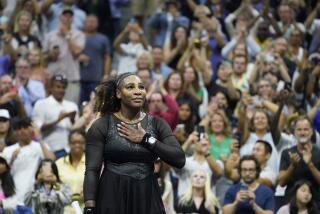Larsson Learns It Takes 3 Sets to Topple the Best in the World : Tennis: Swede can win only two before Sampras rallies for a 4-6, 6-7 (7-4), 7-5, 6-4, 6-4 victory in the Australian Open.
- Share via
MELBOURNE, Australia — Magnus Larsson understands and is at peace with it: You can play a nearly impeccable match, filled with booming serves and slashing groundstrokes, the best you can do, and you can lose.
If you are facing the No. 1 player in the world.
Larsson, from Sweden and ranked No. 15, held Pete Sampras at bay for two sets and slackened only a little before Sampras found an opening and fought back to win, 4-6, 6-7 (7-4), 7-5, 6-4, 6-4. The three-hour match, played today in seasonal heat at center court at the National Tennis Center, was one of the most compelling so far after a quiet first week at the Australian Open.
Sampras got into deep trouble, then worked out of it. He was down two sets, and twice in the third set Larsson came within two points of winning. Only once before has Sampras come back from such a deficit, against Thomas Muster in the French Open in 1991.
A tired but grateful Sampras said he was lucky to win. Being No. 1 in the world has its advantages.
“I don’t think I would have lost to too many players today, the way I played,” Larsson said. “I don’t think I would have let those sets get away to any other player. I can’t play much better than I did, let’s put it that way.”
The last time the players met was at the Grand Slam Cup at Munich in December. Larsson beat Sampras and won $1.5 million. In an odd and awful coincidence, Sampras’ coach, Tim Gullikson, was in a hospital when Sampras played Larsson in Munich. Gullikson is in a hospital here, undergoing tests for a heart problem.
Before the last meeting, Sampras defeated Larsson in a Davis Cup match in September. That foreshadowed this: The match ran just short of three hours and Larsson served 21 aces.
The statistics from today’s match reveal two powerful players going for every shot. Larsson had 19 aces to Sampras’ 18, but they also combined for 95 unforced errors, the sort of thing that happens when players are going for the lines and corners.
Larsson was the aggressor in the early going, and even though Sampras extended him to a tiebreaker in the second set, Larsson was not missing much.
“Basically, for the first two and half sets, I was getting outplayed,” Sampras said. “He was serving better, returning better and moving better than me. He was just playing too good for me. If he was going to maintain that level for a little bit more, he could have pulled it out.”
Larsson was overpowering, particularly on his serve, and he sprayed pinpoint forehand winners from everywhere on the court.
“All I know is that I played great, and he really couldn’t do so much,” Larsson said of the first two sets. “I played it with a lot of pressure on him, and I was hitting a lot of good forehands.”
The accuracy of both players wilted in the heat, adding to the total of unforced errors, even as Sampras began to regain command of his serve. He broke Larsson’s serve to go up, 6-5, in the third set, began the next game with an ace and served out the set.
“I think once I won the third set that was a huge turning point because I think he got down on himself and I picked up my tennis,” Sampras said. “I just hung in there. The difference was, I think he just got a little tight when it came to crunch time in the third set.”
The difference was barely perceptible. Sampras took the next two sets with a service break--in the seventh game of the fourth set and in the third game of the fifth set.
Sampras appeared more relieved than elated after the match, and Larsson was disappointed but not devastated. He seemed to accept that he did all that he could and took away solace in his play.
Sampras said his maturity helped. After speaking with Gullikson on Saturday night and discussing match strategy, Sampras was left to make his own decisions.
“I think it’s the type of match (that) a couple of years ago I would have got pretty down on myself and discouraged,” Sampras said.
“I wouldn’t have quit, but I wouldn’t have had the mental capability of coming back. Now that I’m 23 and I’ve grown up a lot and been through a lot of tough matches. You just have to find some sort of way to win.”
More to Read
Go beyond the scoreboard
Get the latest on L.A.'s teams in the daily Sports Report newsletter.
You may occasionally receive promotional content from the Los Angeles Times.











